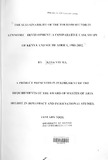| dc.description.abstract | Developing countries usually attach importance to the development of the tourism
industry because it is wrongly or rightly often regarded to as "The passport to Economic
Development". In this regard, the South African government has engaged in a number of
strategies and programmes that aim to stimulate sustainable economic growth based on
tourism development. A number of these programmes are related to developing tourism
in natural, rural areas, and addressing the state's priorities in reducing poverty and
promoting opportunities for the historically disadvantaged. I n addition to land-oriented
programmes, South Africa also has. a number of educational and business related
programmes strategies that aim to improve the capacity of the country to capitalize on
tourism opportunities through joint ventures policies that are government led, private
sector driven and the involvement of the local people in tourism development in South
Africa.
Kenya, like South Africa regards tourism as an important and integral aspect of its
development strategies due to the benefits that arise from tourism. For this reason
recognition is gradually being given to the urgency of developing tourism in an integrated
manner that sustains its resources for perpetual use, economic gain and helps conserve
and not deteriorate natural areas and cultural heritage. This is to ensure that the Kenyan
tourism industry can effectively compete with its South African counterpart.
The fundamental approach to tourism development in South Africa unlike in Kenya,
seeks to involve stakeholders in knowledge exploitation and technology transfer,
embracing tourism product development, promoting community-based tourism with
emphasis on capacity building, promoting domestic regional and intra-regional tourism
and the fostering of tourism research and consultancy. The study involves a comparative analysis that provides the basis for policy shifts in the
Kenyan industry. This is because it is difficult to make a definite assessment of tourism
given that Kenya's sectoral planning for tourism is weak in marked contrast to its good negotiating ability and its high strategic ambitions, hence a rational evaluation of a
tourism strategy is necessary, based on the knowledge of the goal it is intended to further
and alternative ways of furthering them from other countries. This, coupled with
increased concern for environmental protection, following the adoption of agenda 21 for
the Travel and Tourism Industry, has led to the need for revision and harmonization of
existing policies upon which further development and diversification of the tourism
sector of Kenya may be based.
A key element brought about by the need to improve the Kenyan sector is the
introduction of the Tourism Trust Fund, a joint venture between the government and the
European Union, which accounts for the bulk of visitors to the country. The study
concludes by suggesting the policy shifts that Kenyan sector borrow from the South
African sector in order to beat the South African competition and suggestions on the
review of the national policy on the industry through consultative policy with the
stakeholders to make the sector as competitive and successful as the sector in South
Africa. | en |

